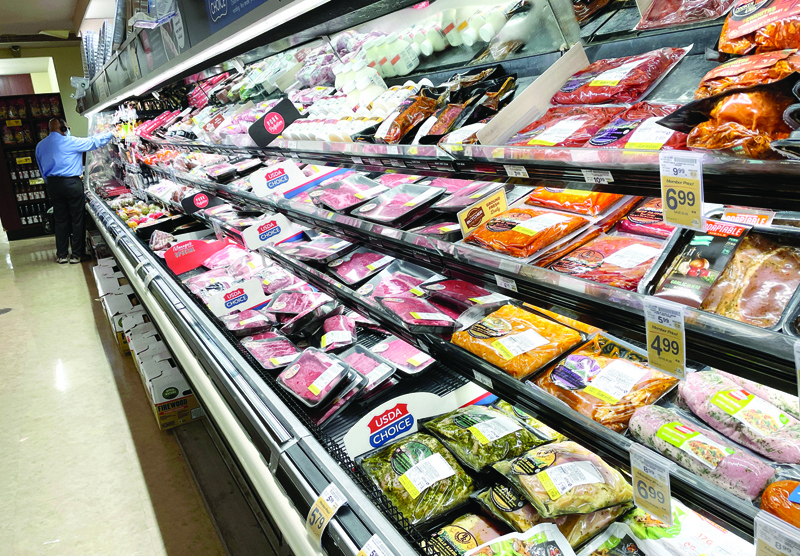 SAN FRANCISCO, US: In this file photo, a customer shops for meat at a Safeway store in San Francisco, California. - AFP
SAN FRANCISCO, US: In this file photo, a customer shops for meat at a Safeway store in San Francisco, California. - AFP
BALTIMORE, US: President Joe Biden acknowledged Wednesday that US shoppers were paying too much for everyday goods, vowing to tackle inflation "head on" after government data showed it had reached a 30-year peak last month. The sharp spike in the consumer price index (CPI) reported by the Labor Department surprised economists and the White House alike, and came as Biden headed to Baltimore to promote the $1.2 trillion infrastructure overhaul he argues can turn the tide.
"Today's economic reports (show) unemployment continuing to fall but consumer prices remaining too high," Biden said in a televised address from the port of Baltimore. The president was in the east coast city to make the case that his infrastructure package, passed by Congress last week, would bring down costs and reduce supply bottlenecks. "Looking out there, everything from a gallon of gas to a loaf of bread costs more," Biden added.
"Even though wages are going up, we still face challenges and we have to tackle them. We have to tackle them head on." The White House said Biden would sign the infrastructure package into law Monday alongside lawmakers from both parties who helped write it and others who smoothed its path to the president's desk. US inflation had remained muted in recent years, but roared back with a vengeance in 2021 as American businesses began resuming normal operations with the help of COVID-19 vaccines.
Prices were pressured by high demand from consumers flush with cash, combined with shortages of US workers and snarls in supply chains worldwide that slowed deliveries of crucial components such as semiconductors. While Biden has argued that the increases will prove temporary, they have given his opponents a potent counterargument to the spending plans he has staked his presidency on as his approval ratings sag.
"Spending trillions of more dollars on the Democrats' tax and spending spree will only make the crisis Americans are facing worse," Republicans on the House Energy and Commerce Committee tweeted, dubbing the trend "Bidenflation." The president scored a victory when Congress passed the infrastructure overhaul last week, but his Build Back Better plan to strengthen America's social safety net with a $1.85 trillion investment over 10 years remains mired in infighting among his Democrats who narrowly control the legislature. Senator Joe Manchin, a Democrat who has objected to the plan's cost, said on Twitter following the CPI report: "By all accounts, the threat posed by record inflation to the American people is not 'transitory' and is instead getting worse."
Prices up everywhere
The 6.2 percent climb in CPI compared to October 2020 was the sharpest annual increase since November 1990, and Mickey Levy of Berenberg Capital Markets said "price pressures have broadened," with an array of goods and services seeing increases. Compared to September, CPI rose 0.9 percent, the Labor Department said, more than double the increase in the prior month and above forecasts from economists. Much of the surge was seen in energy prices, with gasoline spiking 6.1 percent last month alone, and fuel oil seeing a massive 12.3 percent increase.
Grocery prices also climbed last month, with food at home rising one percent, while food away from home, such as meals at restaurants, saw a 0.8 percent increase. Used cars have seen an abnormal price surge throughout 2021 that bolstered overall inflation. After dipping in August and September, the October report showed they again shot up 2.5 percent.
'Going to be horrible'
Amid a nationwide housing shortage, housing costs including rent rose, with a 0.5 percent increase in the shelter category, according to the report. Food and energy prices are volatile, but even with those elements excluded, "core" CPI climbed 0.6 percent last month compared to the 0.2 percent increase in September. "I hate to say this, but October's core CPI is just a taster; the next few months are going to be horrible," Ian Shepherdson of Pantheon Macroeconomics tweeted.
The rapid price increases also create a quandary for the Federal Reserve, which announced it will soon dial back its pandemic stimulus but remain patient before lifting interest rates off zero. Kathy Bostjancic of Oxford Economics warned that inflation will likely stay high into early 2022, "which could lead the Fed to raise rates earlier than our December 2022 forecast." - AFP
.jpg)



